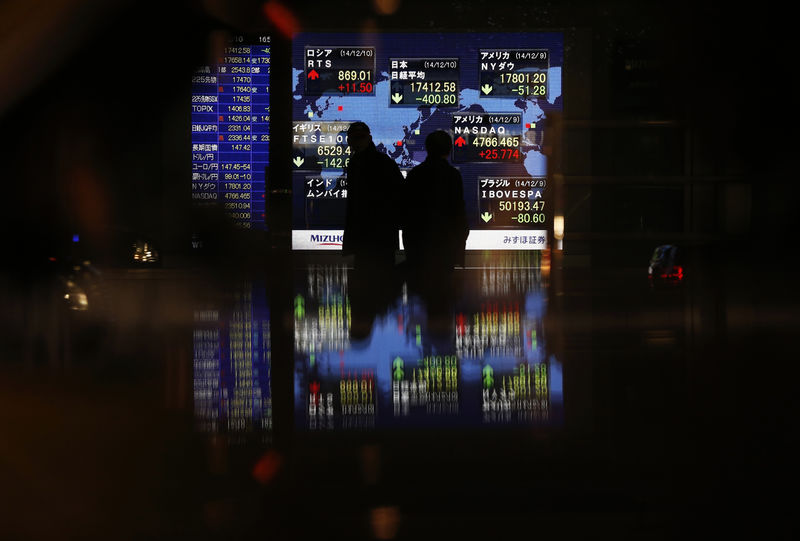 © Reuters. FILE PHOTO: Passersby are silhouetted in front of an electronic board displaying Japan's Nikkei average and various countries' stock price index outside a brokerage in Tokyo
© Reuters. FILE PHOTO: Passersby are silhouetted in front of an electronic board displaying Japan's Nikkei average and various countries' stock price index outside a brokerage in Tokyo
By Tomo Uetake and Noah Sin
SYDNEY/HONG KONG (Reuters) - Asian shares fell to eight-week lows on Thursday as investors waited to see whether Chinese and U.S. trade negotiators can salvage a deal to stave off the threat of fresh U.S. tariff increases, which would damage global economic growth.
Chinese Vice Premier Liu He is set for talks in Washington on Thursday and Friday with U.S. officials who have complained that Beijing has backtracked on earlier commitments.
An agreement could avert a sharp increase in U.S. tariffs on Chinese goods that President Donald Trump has threatened to impose on Friday. China has threatened to retaliate, raising the risk of a major escalation in the bruising trade war between the world's two largest economies.
"If Trump's threat becomes reality, it will be a game changer for the global economy. This is the worst-case scenario we modeled last year that resulted in recession conditions in the United States, a rapid reduction of growth in China, and slower global trade," said Steve Cochrane, chief APAC economist at Moody's Analytics in Singapore.
European stocks are set to open lower, with pan-region down 0.5 percent, and German down 0.4 percent, and futures 0.3 percent lower in early trade.
In Asia, MSCI's broadest index of Asia-Pacific shares outside Japan dropped over 1 percent to its lowest level since March 11.
Stocks extended earlier losses in Asian trade after U.S. President Donald Trump told a rally of supporters that China had "broke the deal" and would be paying for it.
The Chinese market tumbled and hovered close to its 2-1/2-month lows. Shanghai shares slid 0.8 percent, the blue-chip CSI 300 dropped 1 percent, and Hong Kong's lost 1.7 percent.
Japan's average shed 0.9 percent to a five-week low, South Korea's fell over 2 percent while the Australian benchmark added 0.5 percent.
Trump has threatened to raise tariffs to 25 percent from 10 percent on $200 billion worth of Chinese imports at 12:01 a.m. ET (0401GMT) on Friday. Beijing has vowed to retaliate, without giving details.
Kazuhiko Fuji, senior fellow at RIETI, a Japanese government affiliated think-tank, said the talks are looking fragile.
"I would suspect the U.S. will just hand China an ultimatum. No wonder the U.S. yield curve is almost inverting again," he said.
The yield spread between three-month bills and the 10-year notes shrank to 3 basis points, compared with about 15 basis points a few weeks ago.
The closely-watched spread turned negative in late March, spooking investors, who read the development as portending a future recession.
The benchmark stood at 2.469 percent, having hit its lowest level in five weeks of 2.426 percent on Wednesday.
Wall Street shares ended a choppy session flat to lower overnight, with the rising marginally, the and the dropping 0.2 percent and 0.3 percent, respectively. ()
In the currency market, sterling weakened on signs that Brexit talks between Britain's government and the main opposition party may soon collapse.
The pound fell below the psychologically key $1.30 level, touching a six-day low overnight, and last traded at $1.3019.
The against a basket of six major peers was down 0.06 percent at 97.561, with other major currencies also confined to well-trodden ranges. The euro was little changed at $1.1194 and the Japanese yen edged up 0.2 percent against the greenback to 109.92 yen .
In the commodity market, oil prices dropped on Thursday amid concerns over the escalating Sino-U.S. trade battle, despite a surprise fall in stockpiles.
futures dropped 0.6 percent to $69.92 a barrel, while U.S. West Texas Intermediate (WTI) crude also retreated 0.6 percent to $61.75 per barrel.
Shanghai industrial metals fell in early trade on Thursday, while benchmark London hit its lowest in nearly three months, as investors sought safety ahead of the trade talks.
https://www.investing.com/news/stock-market-news/asian-stocks-tank-on-nearing-tariff-threat-drag-down-europe-1861940
2019-05-09 06:11:00Z
52780290069937
Tidak ada komentar:
Posting Komentar